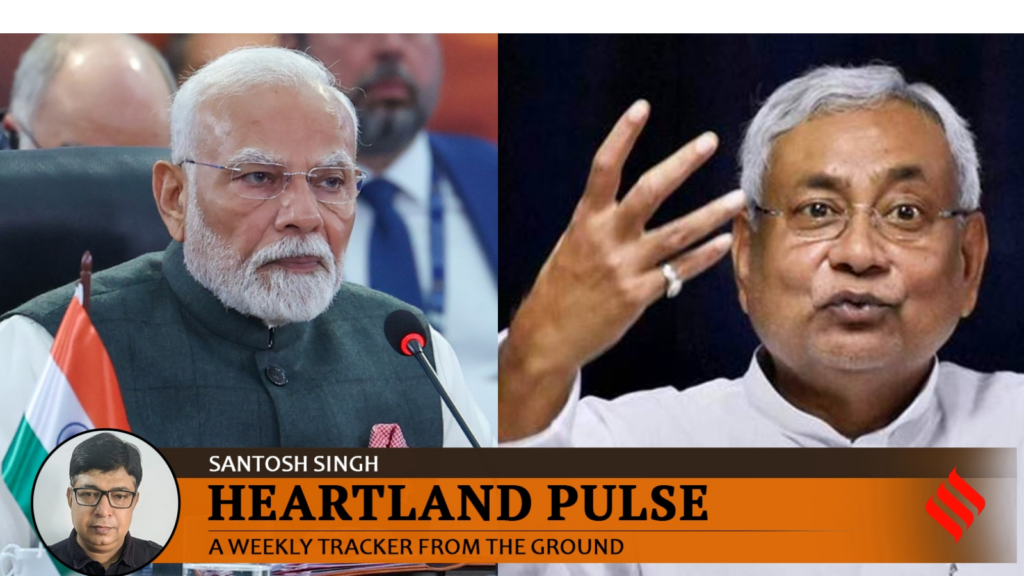With the BJP building its Bihar poll pitch around the “ghuspaithiya (infiltrator)” narrative and alleged demographic crisis in the state, its NDA allies do not appear to be comfortable with the idea.
The BJP had made alleged illegal infiltration a major poll issue in last year’s Jharkhand elections and its attempt to do the same in Bihar this time has led the Opposition to accuse it of trying to find a “scapegoat for failure of the Special Intensive Revision (SIR)” of electoral rolls.
On September 15, Prime Minister Narendra Modi said at a rally in Purnea, “The NDA is committed to drive out each and every infiltrator out of the country … RJD (Rashtriya Janata Dal) and Congress have been trying to protect infiltrators.”
A couple of days later, at an event in Delhi, Union Home Minister Amit Shah followed it up by saying, “Rahul Gandhi wants to win elections on the strength of infiltrators. The Opposition party wants infiltrators to remain in our voter list because it does not have faith in the people of this country and is seeking to win elections on the basis of infiltrators … BJP supports the SIR exercise to cleanse the electoral rolls.’”
During a visit to Bihar the following day, he again said, “The yatra was not about bringing quality education, employment, 24-hour electricity supply or taking roads to each tola of Bihar. The topic was to protect infiltrators (ghuspaithiyo) who have come from Bangladesh.”
Since the Election Commission has not cited any instance of any infiltration during the recent electoral roll revision process, the BJP’s pitch might be geared towards polarising the situation on the ground in a region such as Seemanchal (Araria, Purnia, Katihar and Kishanganj) that has a sizable Muslim population and where the Opposition has competed on equal footing in recent elections. But this is unlikely to work as a pan-Bihar narrative mostly because of likely pushback from allies such as the Janata Dal (United), which has always resisted the BJP’s demographic crisis pitch, and the Lok Janshakti Party (Ram Vilas).
The JD(U) does not appear comfortable with the BJP’s attempt to build up the ghuspaithiya poll plank, given that the party’s ideological grounding is in secular socialist politics. “Our development plank has been our greatest strength. We have been telling people what the Centre and the Bihar government have done for them. We should rather play up our 10 best achievements in comparison to a long period of misrule under the RJD-Congress regime,” said a senior party leader.
Targeting the BJP, RJD national spokesperson Subodh Kumar Mehta said, “Since the PM and Amit Shah cannot defend 20 years of misgovernance in Bihar on count Nitish famous three Cs (crime, corruption and communalism), they have coined the ghuspaithiya jargon. BJP’s main agenda is to polarise the Assembly election in the name of illegal immigrants from Bangladesh. The EC has given an affidavit in the Supreme Court that Bihar does not have any ghuspaithiya. As the NDA sees the writing on the wall, it is using ghuspaithiya as a scapegoat for the failure of the entire SIR process.”
State Congress spokesperson Asit Nath Tiwari asked if the SIR process had identified any voter who is from Bangladesh or Bhutan. “PM Modi talks about sending back each and every ghuspaithiya from the country, but data suggests otherwise,” he said.
Comparing the number of Bangladeshis deported during the tenures of the UPA and the current NDA government, Tiwari said Parliament data showed 77,156 Bangladeshis were sent back between 2005 and 2014, while only 833 were deported between 2015 and 2017 and data between 2018 and 2024 was not found. “We also want to ask if the NDA government has any infiltration data for Bihar. It is nothing but the BJP’s usual attempt to polarise elections. They should rather respond to our leader Rahul Gandhi’s vote chori allegations,” he said.
Political scientist Sajjan Kumar Singh, who is currently researching the dynamics of the coming Assembly elections, said the Congress’s hard push on the “vote chori (theft)” plank had made the BJP deploy the infiltration narrative, something that did not work in Jharkhand last year.
“The Congress has upped the ante against the BJP by shifting the 2024 charge of ‘Constitution in danger’ to ‘vote chori’ in 2025, thereby projecting the ongoing SIR exercise by the Election Commission as an assault on democracy. The BJP has countered the Congress by labelling the party as pro-ghuspaithiya, a charge aimed at constituting the counter-perception among Bihar’s electorate. This counter-narrative appeals to the existing perception of Biharis, particularly in the Seemanchal region of the state, where the ghuspaithiya factor has been a political issue since the late 1970s.”
Singh said while the “emotive appeal” on the issue of alleged infiltration might resonate with a significant section of the electorate across Bihar, “the degree of their positive correlation with people’s voting choices may vary in different regions”.

